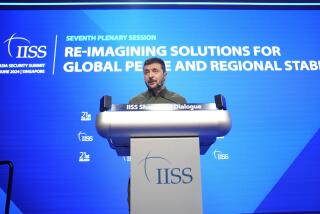French Stall New European Arms Talks
- Share via
VIENNA — The process of setting up conventional arms reductions talks in Europe has been badly disrupted by France, officials said here Tuesday.
U.S., British and West German officials are said to be furious at the French for suddenly reneging on a previous compromise involving new arms talks in Europe.
“This is a serious matter, and we don’t know how it will be resolved,” admitted a senior diplomat at the Conference on Security and Cooperation in Europe, which is meeting in Vienna.
Western officials had hoped that after 2 1/2 years of meetings, the long-running, follow-up conference to the 1975 Helsinki accords on East-West security could wind up by the end of the year.
With an agreement on human rights in Vienna, new conventional arms control talks--which have been urged by the United States and Soviet Union--would begin early next year.
The conventional arms stability talks were to have taken place under the aegis of the 35-nation Conference on Security and Cooperation as soon as the Soviets approved a related accord on observing human rights and releasing political prisoners.
The Kremlin was reportedly near agreement on such a prisoner release, in exchange for Western approval of a human rights conference to be held in Moscow in 1991.
The United States and other Western powers insisted that the arms talks be restricted to North Atlantic Treaty Organization and Warsaw Pact nations, leaving out the 12 neutral European countries, which are also members of the security conference.
The 35-nation group includes all European nations--except Albania--and the United States and Canada.
In a compromise reached in 1987, France agreed that only the NATO and Warsaw Pact members would participate in the talks, although the other security conference members would be kept informed. France, as a NATO member, would be included in the talks even though its armed forces are not under NATO control.
‘Wanted to Review Situation’
Recently, however, “the French said they wanted to review the whole situation,” a well-placed Western diplomat said Tuesday.
“They seem to have gone back to the idea that arms talks should be European-wide, rather than between the East-West alliances,” the diplomat said. “ . . . We don’t know how we will resolve it.”
In Paris, French President Francois Mitterrand appeared to confirm his nation’s new stance, saying that NATO and Warsaw Pact nations must not monopolize the conventional arms talks, Reuters news service reported.
In an interview published today in the left-wing French daily newspaper Liberation, Mitterrand said the talks must include the 12 neutral members of the security conference. In addition, he warned Western allies against using his country’s stance as a pretext to delay the talks, stressing that cuts in conventional arms are a priority for France.
Many strategic analysts believe that conventional arms reduction between East and West in Europe is even more important than the nuclear arms cuts being negotiated in Geneva.
France’s views were considered an important component of the proposed talks. West Germany, and to a lesser degree the Soviet Union, wanted to include the French, since they are a major European military power.
Diplomats say that the French action plays into the hands of the Soviets because the pressure on Moscow to release political prisoners has been reduced.
“It certainly upsets the timetable for reaching a human rights accord here and starting conventional arms talks,” commented a senior official.
The outlook now, barring another change in the French position, is for the security conference talks to be adjourned without agreement in mid-December, diplomats say, and resumed here some time early next year.
More to Read
Sign up for Essential California
The most important California stories and recommendations in your inbox every morning.
You may occasionally receive promotional content from the Los Angeles Times.










